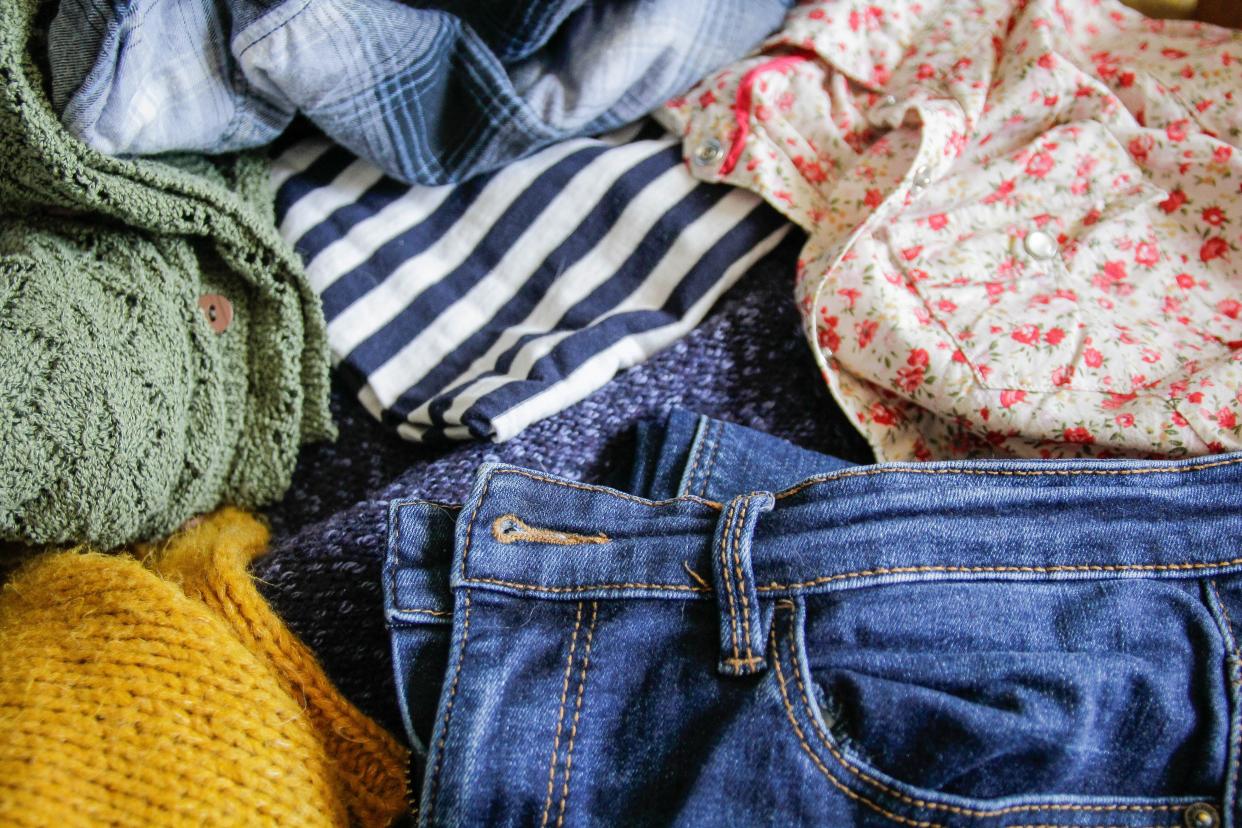This Is Your Sign to Finally Get Rid of Your “One Day When I’m Thinner” Clothes

Kinga Krzeminska/Getty Images
For nearly a decade, a Reformation crop top followed me everywhere. It came along when I moved into my college dorm, then into my first post-grad apartment, and most recently to New York City when I accepted my job here at SELF. The thing is, I haven’t worn this shirt since I was in high school—not because I don’t want to (trust me, it’s super cute)—but because it simply doesn’t fit my body anymore, no matter how hard I try to squeeze myself into it.
Why, then, is this too-tight item still collecting dust in my closet? I feel bad getting rid of something I spent $90 on, for one, but if I’m being honest, the real reason I’ve kept the top for so long is that I’m clinging to the hope that one day I’ll be able to zip it up again—that I’ll morph back into my thinner, “better” former self.
And of course I’m having a hard time letting go of the desire to be the smallest version of myself. Diet culture constantly tries to convince us all that thinner is better—which, for the record, simply isn’t true. Healthy and happy people come in all different shapes and sizes and, pertinent to my Crop Top of Shame, those shapes and sizes aren’t meant to stay the same forever.
“You’re going to grow and change as you go through life, and it’s natural for your weight to fluctuate,” Elizabeth Daniels, PhD, a psychologist specializing in body image and director of the Centre for Appearance Research at the University of the West of England, tells SELF. “You might lose weight. You might gain weight.” In other words, bodies evolve—due to pregnancy, PMS, or menopause, for example, and simply as a natural part of aging—and there’s nothing wrong with that. Yet, thanks to the body-standard BS we mentioned above, many of us “resort to punishing techniques to try to attain that goal of looking a certain ‘ideal’ way,” Dr. Daniels says—and punish ourselves by holding onto clothes that are too restrictive.
It may seem relatively harmless to keep certain items “just in case” they fit again someday, but there are a few reasons why it’s really not, according to Dr. Daniels. First, seeing that blouse from your college days, say, or a pair of jeans that you could (just barely) squeeze into a couple of years ago can instantly trigger negative self-talk about your appearance and worth. (For example: Ugh, I used to look so much better. What the hell happened? Or I don’t deserve new outfits until I can get back down to my old size.)
Also, many people hold onto too-small clothes as a form of “motivation,” Dr. Daniels says. The typical thinking behind that toxic move: Once upon a time, you did fit into that pair of pants (or dress, or whatever), so by keeping it in your closet, you can “inspire” yourself to fit into it again—by restricting your food. Diets almost always fail eventually, though. And more importantly, using uncomfortably snug clothes as a “goal” only reinforces the destructive idea that your current body is a problem (it’s not!) and that thinness equals happiness (it doesn’t!).
Unfortunately, you can’t unlearn years of diet culture brainwashing overnight and pretend it doesn’t suck that your favorite jeans no longer button up. Quieting that inner critic takes time and work (our Diet Culture Detox course can help with that). In the meantime, though, one small thing you can do to challenge those fucked-up standards and feel a little better is free yourself from guilt-inducing clothes.
We understand that ditching those high-waisted shorts that dig into your stomach might feel like you’re giving up on an “ideal,” happier version of yourself. But the opposite is true: You’re much more likely to feel content in the present if you’re not weighed down by a constant (false) reminder that your worth hinges on wearing a certain size.
If your concern is being “wasteful,” Dr. Daniels recommends donating any ill-fitting pieces (to your local Goodwill, The Salvation Army, or Dress For Success, a worldwide organization that provides gently used professional clothing to low-income women) for someone else to enjoy. Personally, I try to sell things that feel too constraining on Facebook Marketplace, Poshmark, or Depop—then use whatever money I earned to invest in cuter stuff that flatters my current body and makes me happy. (Wearing outfits that boost your mood and confidence is called dopamine dressing, by the way, and we recommend giving it a try!)
If the clothes you’re bidding farewell to also hold sentimental value (like a swimsuit from last year’s family vacation, for instance, or your mom’s vintage hand-me-down skirt), you can consider storing these mementos out of sight, like under your bed or in an opaque bin in your closet. That way, they’re less likely to make you feel crappy about yourself, and you might eventually find it easier to part with them for good whenever you’re ready, as SELF previously reported.
So the next time a too-tight garment is mentally tormenting you, remember that your wardrobe should fit your body—not the other way around. Take it from me, someone who’s recently found freedom in this mindset shift: I finally let go of that Reformation top while writing this article, and that small decision has made me feel so much more confident. I hope you will, too, once that suffocating years-old ’fit you’re holding onto is no longer holding you back.
Related:
Originally Appeared on SELF


